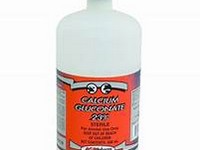Calcium gluconate
CLINICAL USE
Hypocalcaemia
DOSE IN NORMAL RENAL FUNCTION
Depending on indication
PHARMACOKINETICS
DOSE IN RENAL IMPAIRMENT
GFR (mL/MIN)
DOSE IN PATIENTS UNDERGOING RENAL REPLACEMENT THERAPIES
IMPORTANT DRUG INTERACTIONS
Potentially hazardous interactions with other drugs
ADMINISTRATION
Reconstition
–
Route
Oral, IV, IM
Rate of Administration
IV: slow 3–4 minutes for each 10 mL (2.25 mmol calcium); not greater than 20 mmol/hour for continuous infusions
Comments
IV: Can be used undiluted for continuous and intermittent infusions
